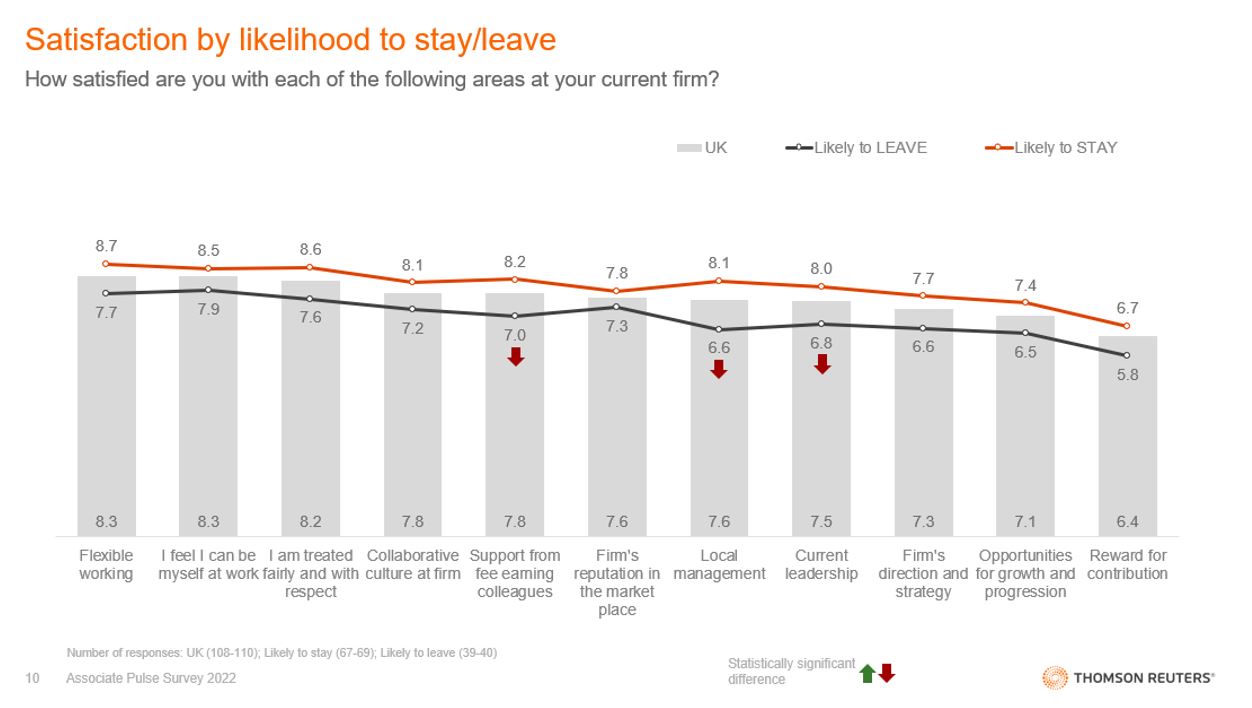Pressure is high for law firms to retain their top lawyers, especially new associates; and many would be wise to examine the data that shows why lawyers leave their current firms
The demand for legal services in the United Kingdom remains strong in 2022 and is likely to continue to do so as UK clients say they’re likely to increase their spending on outside legal counsel, according to the State of the UK Legal Market 2022 report, which noted “the percentage of UK legal buyers saying they’re anticipating growth in their overall legal spend in the coming months saw a huge increase, especially in practice areas like regulatory.”
Further, unemployment in the UK remains historically low, sitting at under 4% for all of 2022; however, economic uncertainty has increased in recent months and future prognostications seem a bit grim.
This combination of robust demand and low unemployment puts pressure on UK law firms to retain their lawyers, especially their associates, amid high competition for talent in the country and across Europe. Indeed, the flight risk of associates, the majority (60%) of whom classify themselves as senior associates, remains elevated at 37%, according to a recent pulse survey conducted by the Thomson Reuters Institute in July 2022. This measure of how many associate lawyers are contemplating leaving their current firm compares to a flight risk of 25% for mostly partners, according our stand-out lawyer research.
The Top 5 factors that are forcing these associates to consider moving on from their employers include:
-
-
-
- feeling under-appreciated (identified by 48% of associates as a key factor);
- the firm’s compensation system (45%);
- lack of career progression (38%);
- their current compensation (35%); and
- a lack of genuine regard for their well-being (25%).
-
-
What is interesting about the feedback from UK associates is that a higher concentration of lawyers indicated dissatisfaction on factors having to do with the law firm’s culture and career progression when compared to their peers in the United States and Canada. (See table below)

Flexibility cited as a major driver of satisfaction
The strong desire for flexibility — in terms of when, where, and how work gets done — dominated the feedback from associates as a top driver of satisfaction:
For example, when asked about what they like best about their current employer, 45% of associates who are consider flight risks cited “flexible work practices” as the top factor. Other often-cited factors include people/colleagues (25%); culture/environment (22%); and quality of work (21%).
Out of those associates who are most likely to stay at their firms, 65% cited flexible working as a main driver of their decision. Additionally, 62% of associates ranked “I am treated fairly” as a second most popular driver; and 57% indicated “I can be myself at work” as the third most popular one.
Conversely, the biggest gaps in drivers of satisfaction between associates who are likely to stay or leave their current firms revealed that law firm management, leaders, and fee-earning colleagues have some work to do. (See chart below)

Further, women associates have a greater flight risk than that of men, but only by four percentage points (36% to 32%). For the most part, the Top 3 drivers of satisfaction were consistent between the two, although those in the second and third spots for women were reversed for men.

Recommendations for action
Taking in all of this data, UK law firms should see the opportunity they have to double-down on what associates appreciate most about the firm, such as:
-
-
- Flexibility— Firms should continue to emphasize flexible working as part of their commitment to employee well-being. Associates, whether they indicated a likelihood to leave or stay, indicated that flexibility was a top driver of satisfaction.
- Fair treatment — Continuing to provide a sense of fair treatment is a strength for firms according to associates feedback. Indeed, this is an area for law firms to tout in their efforts to retain associates.
- ‘Being myself at work’ — Law firms are doing a decent job at providing an environment where associates feel they can “be myself at work.” Indeed, it was identified as Top 3 factor for men and women and a Top 2 driver among those who were likely to leave.
-
At the same time, law firms need to address the gaps in those areas that associates identified as ones of less-than-ideal satisfaction, especially when it comes to feelings of under-appreciation and a lack of career progression. Focusing on these areas will also help law firms to shrink the satisfaction gaps associates feel for law firm management, leaders, and fee-earning colleagues.
Indeed, showing appreciations or simply saying “Thank you” is one of the easiest ways to demonstrate to employees that they are valued. Even better, showing gratitude for associates’ contributions by local management, fee-earning colleagues, and leadership — areas which had the biggest gaps between in satisfaction among associates — would have a multiplier effect on retention by improving lawyers’ feelings of appreciation and their positive views on management, leadership, and partners.
Also, firms should work on expanding options for career advancement beyond the simple path to partnership by explaining and emphasizing the path to Of Counsel or other legal professional roles, or the possibility of reduced hours or part-time work. In addition, consistently asking questions like, “How can I support you in your career development?” or “What can I do to ensure you have a rewarding career here?” are easy ways for firm leaders to show they care about associates’ career progression.
These investments of time and energy will help UK-based law firms boost their retention of associates and contribute to lower attrition rates overall. At the current salary rate of six figures per associate, multiplied by the current rates of attrition experienced by many law firms, offering a simple “Thank you” and “Well done” are a pretty small outlay relative to the cost of losing key talent.







